Gendered Experience of Mental Health: Bangladeshi Community, Toronto
VerifiedAdded on 2021/11/19
|14
|3593
|442
Project
AI Summary
This research proposal outlines an anthropological study on the gendered experiences of mental health and wellbeing within the Bangladeshi community in Toronto. The research aims to understand how Bangladeshi immigrants negotiate their mental health and wellbeing in a new cultural context, considering factors such as social class, nationalism, religious perspectives, and urbanization. The study will employ a cross-cultural comparison and ethnographic methodology, including fieldwork in Toronto, to collect data through observations and semi-structured interviews. The research will focus on the process of acculturation, the strategies used by the community to achieve wellbeing, and the impact of urban spaces and gender roles on mental health. The study will also explore the challenges faced by immigrants, such as discrimination and the high cost of living, and the various strategies developed by the community to enhance their wellbeing. The study will use purposive and snowball sampling to gather data from sixty Bangladeshi Bengali immigrant households representing three major religious groups.
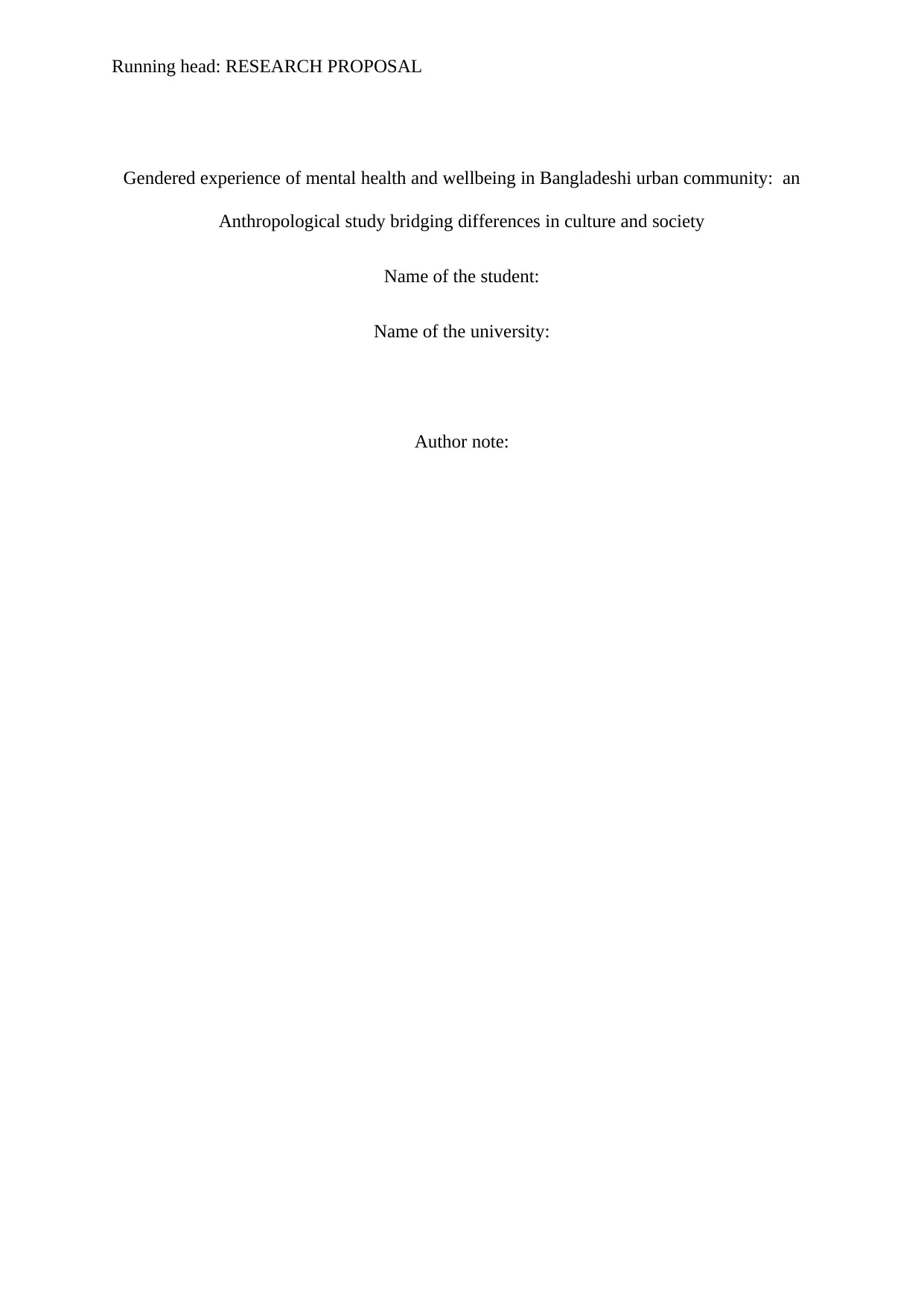
Running head: RESEARCH PROPOSAL
Gendered experience of mental health and wellbeing in Bangladeshi urban community: an
Anthropological study bridging differences in culture and society
Name of the student:
Name of the university:
Author note:
Gendered experience of mental health and wellbeing in Bangladeshi urban community: an
Anthropological study bridging differences in culture and society
Name of the student:
Name of the university:
Author note:
Paraphrase This Document
Need a fresh take? Get an instant paraphrase of this document with our AI Paraphraser
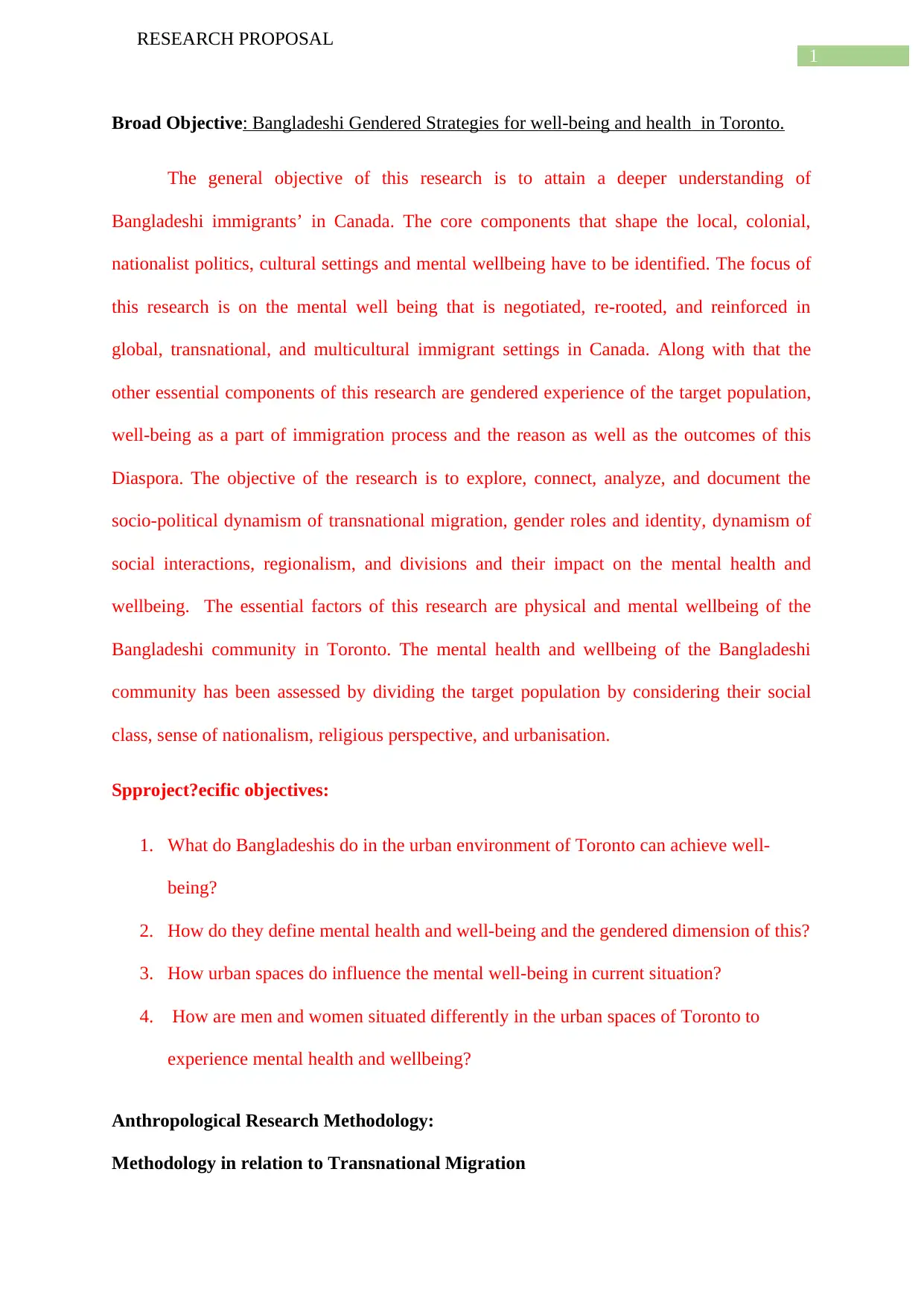
1
RESEARCH PROPOSAL
Broad Objective: Bangladeshi Gendered Strategies for well-being and health in Toronto.
The general objective of this research is to attain a deeper understanding of
Bangladeshi immigrants’ in Canada. The core components that shape the local, colonial,
nationalist politics, cultural settings and mental wellbeing have to be identified. The focus of
this research is on the mental well being that is negotiated, re-rooted, and reinforced in
global, transnational, and multicultural immigrant settings in Canada. Along with that the
other essential components of this research are gendered experience of the target population,
well-being as a part of immigration process and the reason as well as the outcomes of this
Diaspora. The objective of the research is to explore, connect, analyze, and document the
socio-political dynamism of transnational migration, gender roles and identity, dynamism of
social interactions, regionalism, and divisions and their impact on the mental health and
wellbeing. The essential factors of this research are physical and mental wellbeing of the
Bangladeshi community in Toronto. The mental health and wellbeing of the Bangladeshi
community has been assessed by dividing the target population by considering their social
class, sense of nationalism, religious perspective, and urbanisation.
Spproject?ecific objectives:
1. What do Bangladeshis do in the urban environment of Toronto can achieve well-
being?
2. How do they define mental health and well-being and the gendered dimension of this?
3. How urban spaces do influence the mental well-being in current situation?
4. How are men and women situated differently in the urban spaces of Toronto to
experience mental health and wellbeing?
Anthropological Research Methodology:
Methodology in relation to Transnational Migration
RESEARCH PROPOSAL
Broad Objective: Bangladeshi Gendered Strategies for well-being and health in Toronto.
The general objective of this research is to attain a deeper understanding of
Bangladeshi immigrants’ in Canada. The core components that shape the local, colonial,
nationalist politics, cultural settings and mental wellbeing have to be identified. The focus of
this research is on the mental well being that is negotiated, re-rooted, and reinforced in
global, transnational, and multicultural immigrant settings in Canada. Along with that the
other essential components of this research are gendered experience of the target population,
well-being as a part of immigration process and the reason as well as the outcomes of this
Diaspora. The objective of the research is to explore, connect, analyze, and document the
socio-political dynamism of transnational migration, gender roles and identity, dynamism of
social interactions, regionalism, and divisions and their impact on the mental health and
wellbeing. The essential factors of this research are physical and mental wellbeing of the
Bangladeshi community in Toronto. The mental health and wellbeing of the Bangladeshi
community has been assessed by dividing the target population by considering their social
class, sense of nationalism, religious perspective, and urbanisation.
Spproject?ecific objectives:
1. What do Bangladeshis do in the urban environment of Toronto can achieve well-
being?
2. How do they define mental health and well-being and the gendered dimension of this?
3. How urban spaces do influence the mental well-being in current situation?
4. How are men and women situated differently in the urban spaces of Toronto to
experience mental health and wellbeing?
Anthropological Research Methodology:
Methodology in relation to Transnational Migration
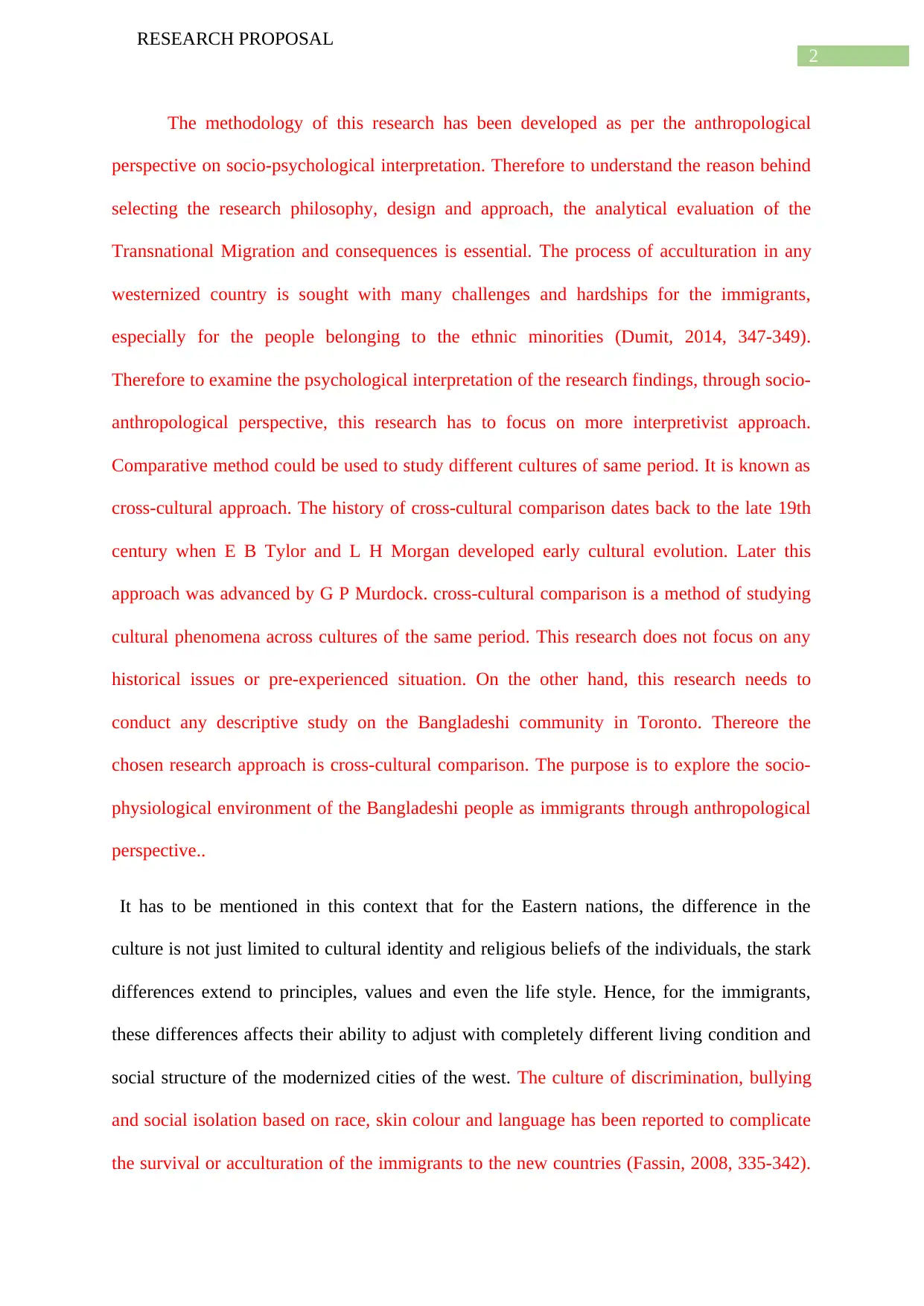
2
RESEARCH PROPOSAL
The methodology of this research has been developed as per the anthropological
perspective on socio-psychological interpretation. Therefore to understand the reason behind
selecting the research philosophy, design and approach, the analytical evaluation of the
Transnational Migration and consequences is essential. The process of acculturation in any
westernized country is sought with many challenges and hardships for the immigrants,
especially for the people belonging to the ethnic minorities (Dumit, 2014, 347-349).
Therefore to examine the psychological interpretation of the research findings, through socio-
anthropological perspective, this research has to focus on more interpretivist approach.
Comparative method could be used to study different cultures of same period. It is known as
cross-cultural approach. The history of cross-cultural comparison dates back to the late 19th
century when E B Tylor and L H Morgan developed early cultural evolution. Later this
approach was advanced by G P Murdock. cross-cultural comparison is a method of studying
cultural phenomena across cultures of the same period. This research does not focus on any
historical issues or pre-experienced situation. On the other hand, this research needs to
conduct any descriptive study on the Bangladeshi community in Toronto. Thereore the
chosen research approach is cross-cultural comparison. The purpose is to explore the socio-
physiological environment of the Bangladeshi people as immigrants through anthropological
perspective..
It has to be mentioned in this context that for the Eastern nations, the difference in the
culture is not just limited to cultural identity and religious beliefs of the individuals, the stark
differences extend to principles, values and even the life style. Hence, for the immigrants,
these differences affects their ability to adjust with completely different living condition and
social structure of the modernized cities of the west. The culture of discrimination, bullying
and social isolation based on race, skin colour and language has been reported to complicate
the survival or acculturation of the immigrants to the new countries (Fassin, 2008, 335-342).
RESEARCH PROPOSAL
The methodology of this research has been developed as per the anthropological
perspective on socio-psychological interpretation. Therefore to understand the reason behind
selecting the research philosophy, design and approach, the analytical evaluation of the
Transnational Migration and consequences is essential. The process of acculturation in any
westernized country is sought with many challenges and hardships for the immigrants,
especially for the people belonging to the ethnic minorities (Dumit, 2014, 347-349).
Therefore to examine the psychological interpretation of the research findings, through socio-
anthropological perspective, this research has to focus on more interpretivist approach.
Comparative method could be used to study different cultures of same period. It is known as
cross-cultural approach. The history of cross-cultural comparison dates back to the late 19th
century when E B Tylor and L H Morgan developed early cultural evolution. Later this
approach was advanced by G P Murdock. cross-cultural comparison is a method of studying
cultural phenomena across cultures of the same period. This research does not focus on any
historical issues or pre-experienced situation. On the other hand, this research needs to
conduct any descriptive study on the Bangladeshi community in Toronto. Thereore the
chosen research approach is cross-cultural comparison. The purpose is to explore the socio-
physiological environment of the Bangladeshi people as immigrants through anthropological
perspective..
It has to be mentioned in this context that for the Eastern nations, the difference in the
culture is not just limited to cultural identity and religious beliefs of the individuals, the stark
differences extend to principles, values and even the life style. Hence, for the immigrants,
these differences affects their ability to adjust with completely different living condition and
social structure of the modernized cities of the west. The culture of discrimination, bullying
and social isolation based on race, skin colour and language has been reported to complicate
the survival or acculturation of the immigrants to the new countries (Fassin, 2008, 335-342).
⊘ This is a preview!⊘
Do you want full access?
Subscribe today to unlock all pages.

Trusted by 1+ million students worldwide
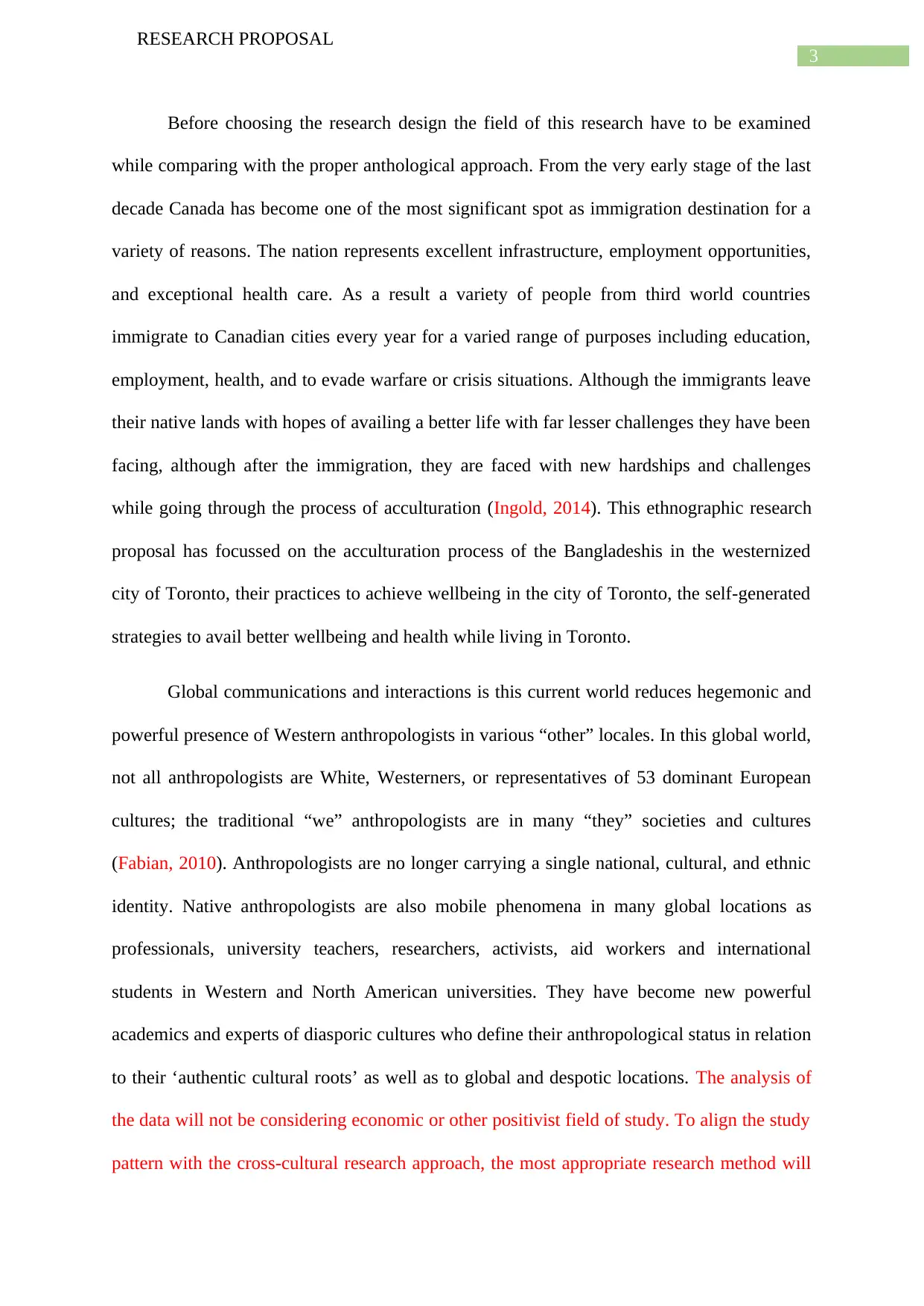
3
RESEARCH PROPOSAL
Before choosing the research design the field of this research have to be examined
while comparing with the proper anthological approach. From the very early stage of the last
decade Canada has become one of the most significant spot as immigration destination for a
variety of reasons. The nation represents excellent infrastructure, employment opportunities,
and exceptional health care. As a result a variety of people from third world countries
immigrate to Canadian cities every year for a varied range of purposes including education,
employment, health, and to evade warfare or crisis situations. Although the immigrants leave
their native lands with hopes of availing a better life with far lesser challenges they have been
facing, although after the immigration, they are faced with new hardships and challenges
while going through the process of acculturation (Ingold, 2014). This ethnographic research
proposal has focussed on the acculturation process of the Bangladeshis in the westernized
city of Toronto, their practices to achieve wellbeing in the city of Toronto, the self-generated
strategies to avail better wellbeing and health while living in Toronto.
Global communications and interactions is this current world reduces hegemonic and
powerful presence of Western anthropologists in various “other” locales. In this global world,
not all anthropologists are White, Westerners, or representatives of 53 dominant European
cultures; the traditional “we” anthropologists are in many “they” societies and cultures
(Fabian, 2010). Anthropologists are no longer carrying a single national, cultural, and ethnic
identity. Native anthropologists are also mobile phenomena in many global locations as
professionals, university teachers, researchers, activists, aid workers and international
students in Western and North American universities. They have become new powerful
academics and experts of diasporic cultures who define their anthropological status in relation
to their ‘authentic cultural roots’ as well as to global and despotic locations. The analysis of
the data will not be considering economic or other positivist field of study. To align the study
pattern with the cross-cultural research approach, the most appropriate research method will
RESEARCH PROPOSAL
Before choosing the research design the field of this research have to be examined
while comparing with the proper anthological approach. From the very early stage of the last
decade Canada has become one of the most significant spot as immigration destination for a
variety of reasons. The nation represents excellent infrastructure, employment opportunities,
and exceptional health care. As a result a variety of people from third world countries
immigrate to Canadian cities every year for a varied range of purposes including education,
employment, health, and to evade warfare or crisis situations. Although the immigrants leave
their native lands with hopes of availing a better life with far lesser challenges they have been
facing, although after the immigration, they are faced with new hardships and challenges
while going through the process of acculturation (Ingold, 2014). This ethnographic research
proposal has focussed on the acculturation process of the Bangladeshis in the westernized
city of Toronto, their practices to achieve wellbeing in the city of Toronto, the self-generated
strategies to avail better wellbeing and health while living in Toronto.
Global communications and interactions is this current world reduces hegemonic and
powerful presence of Western anthropologists in various “other” locales. In this global world,
not all anthropologists are White, Westerners, or representatives of 53 dominant European
cultures; the traditional “we” anthropologists are in many “they” societies and cultures
(Fabian, 2010). Anthropologists are no longer carrying a single national, cultural, and ethnic
identity. Native anthropologists are also mobile phenomena in many global locations as
professionals, university teachers, researchers, activists, aid workers and international
students in Western and North American universities. They have become new powerful
academics and experts of diasporic cultures who define their anthropological status in relation
to their ‘authentic cultural roots’ as well as to global and despotic locations. The analysis of
the data will not be considering economic or other positivist field of study. To align the study
pattern with the cross-cultural research approach, the most appropriate research method will
Paraphrase This Document
Need a fresh take? Get an instant paraphrase of this document with our AI Paraphraser
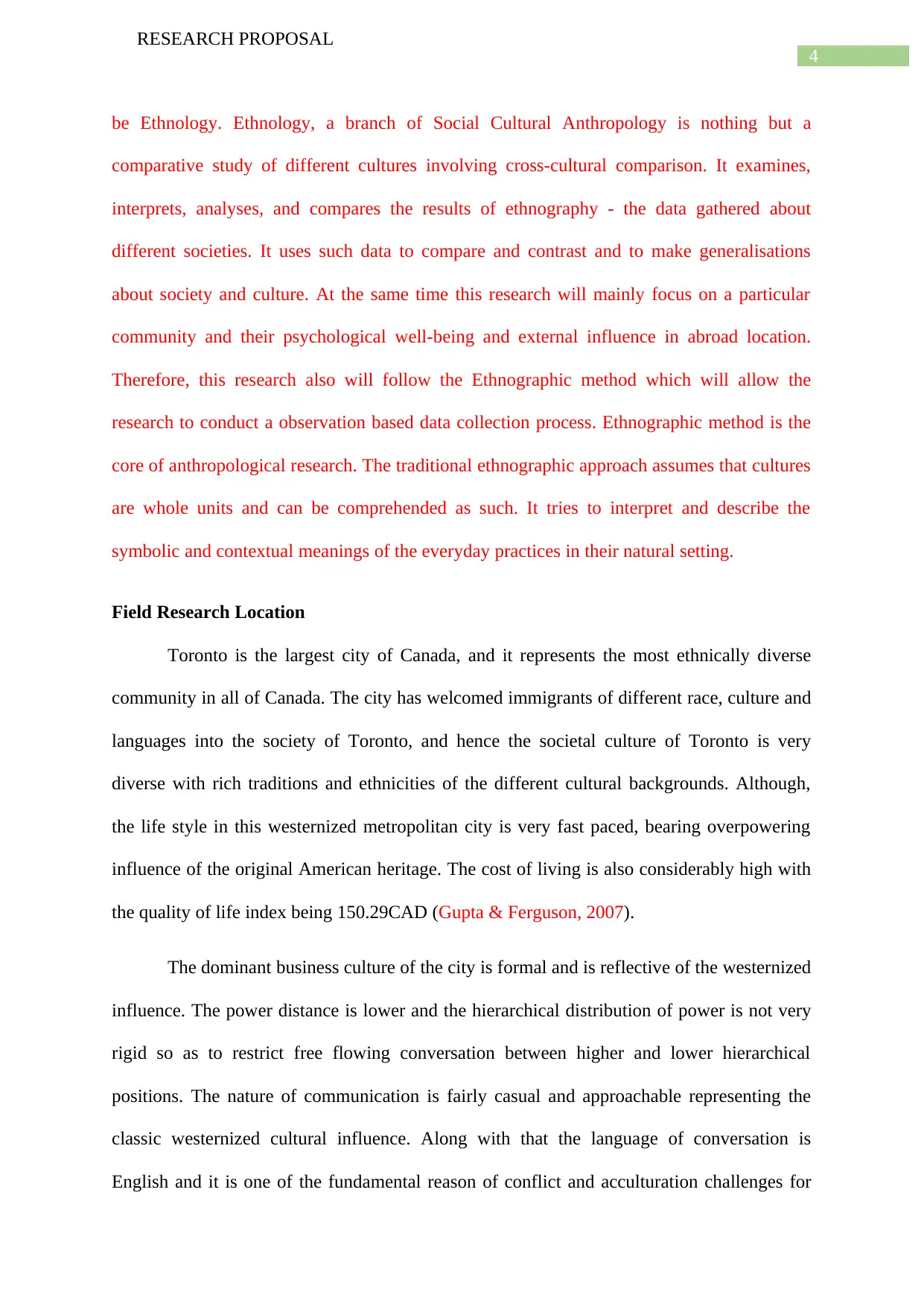
4
RESEARCH PROPOSAL
be Ethnology. Ethnology, a branch of Social Cultural Anthropology is nothing but a
comparative study of different cultures involving cross-cultural comparison. It examines,
interprets, analyses, and compares the results of ethnography - the data gathered about
different societies. It uses such data to compare and contrast and to make generalisations
about society and culture. At the same time this research will mainly focus on a particular
community and their psychological well-being and external influence in abroad location.
Therefore, this research also will follow the Ethnographic method which will allow the
research to conduct a observation based data collection process. Ethnographic method is the
core of anthropological research. The traditional ethnographic approach assumes that cultures
are whole units and can be comprehended as such. It tries to interpret and describe the
symbolic and contextual meanings of the everyday practices in their natural setting.
Field Research Location
Toronto is the largest city of Canada, and it represents the most ethnically diverse
community in all of Canada. The city has welcomed immigrants of different race, culture and
languages into the society of Toronto, and hence the societal culture of Toronto is very
diverse with rich traditions and ethnicities of the different cultural backgrounds. Although,
the life style in this westernized metropolitan city is very fast paced, bearing overpowering
influence of the original American heritage. The cost of living is also considerably high with
the quality of life index being 150.29CAD (Gupta & Ferguson, 2007).
The dominant business culture of the city is formal and is reflective of the westernized
influence. The power distance is lower and the hierarchical distribution of power is not very
rigid so as to restrict free flowing conversation between higher and lower hierarchical
positions. The nature of communication is fairly casual and approachable representing the
classic westernized cultural influence. Along with that the language of conversation is
English and it is one of the fundamental reason of conflict and acculturation challenges for
RESEARCH PROPOSAL
be Ethnology. Ethnology, a branch of Social Cultural Anthropology is nothing but a
comparative study of different cultures involving cross-cultural comparison. It examines,
interprets, analyses, and compares the results of ethnography - the data gathered about
different societies. It uses such data to compare and contrast and to make generalisations
about society and culture. At the same time this research will mainly focus on a particular
community and their psychological well-being and external influence in abroad location.
Therefore, this research also will follow the Ethnographic method which will allow the
research to conduct a observation based data collection process. Ethnographic method is the
core of anthropological research. The traditional ethnographic approach assumes that cultures
are whole units and can be comprehended as such. It tries to interpret and describe the
symbolic and contextual meanings of the everyday practices in their natural setting.
Field Research Location
Toronto is the largest city of Canada, and it represents the most ethnically diverse
community in all of Canada. The city has welcomed immigrants of different race, culture and
languages into the society of Toronto, and hence the societal culture of Toronto is very
diverse with rich traditions and ethnicities of the different cultural backgrounds. Although,
the life style in this westernized metropolitan city is very fast paced, bearing overpowering
influence of the original American heritage. The cost of living is also considerably high with
the quality of life index being 150.29CAD (Gupta & Ferguson, 2007).
The dominant business culture of the city is formal and is reflective of the westernized
influence. The power distance is lower and the hierarchical distribution of power is not very
rigid so as to restrict free flowing conversation between higher and lower hierarchical
positions. The nature of communication is fairly casual and approachable representing the
classic westernized cultural influence. Along with that the language of conversation is
English and it is one of the fundamental reason of conflict and acculturation challenges for
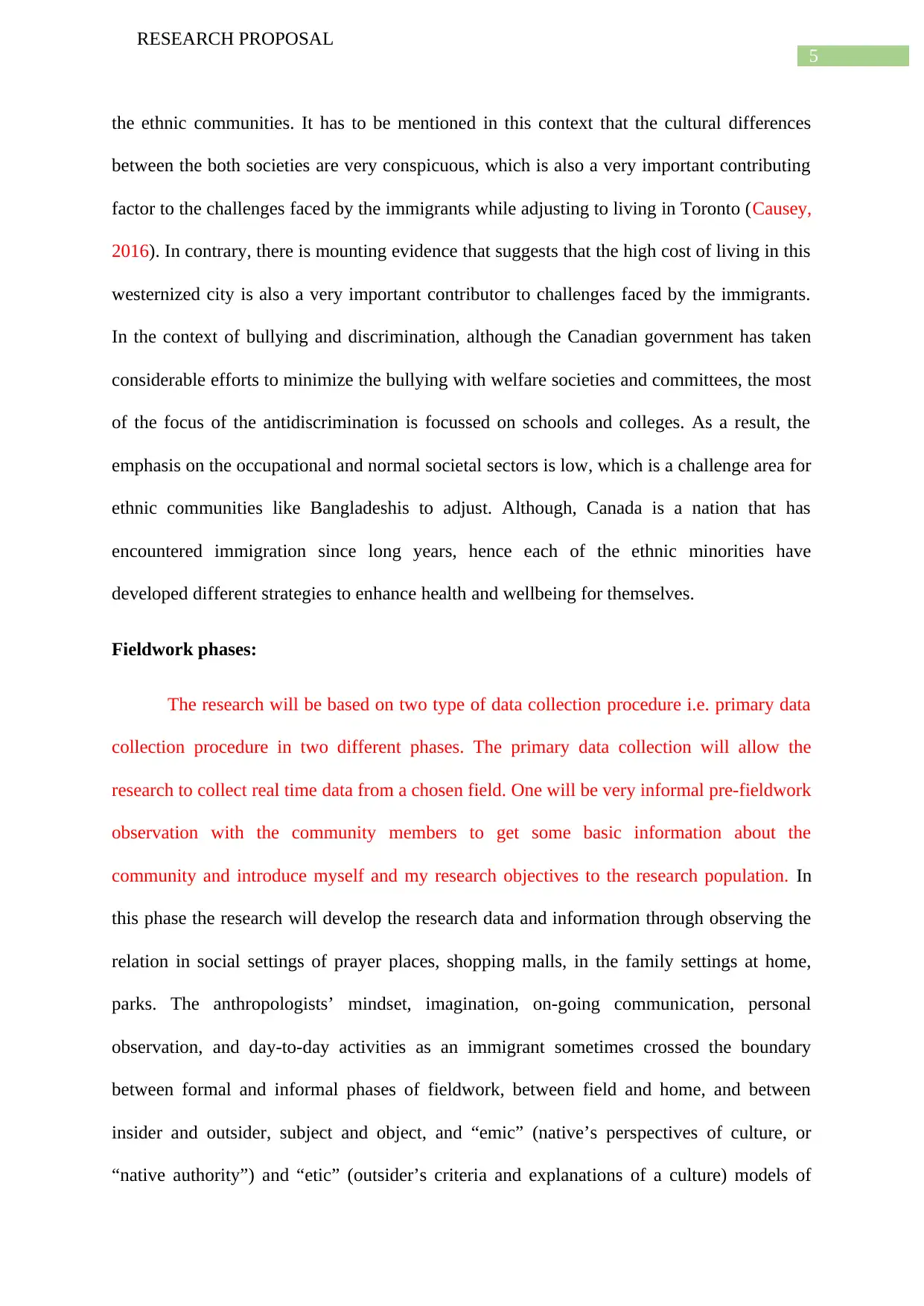
5
RESEARCH PROPOSAL
the ethnic communities. It has to be mentioned in this context that the cultural differences
between the both societies are very conspicuous, which is also a very important contributing
factor to the challenges faced by the immigrants while adjusting to living in Toronto (Causey,
2016). In contrary, there is mounting evidence that suggests that the high cost of living in this
westernized city is also a very important contributor to challenges faced by the immigrants.
In the context of bullying and discrimination, although the Canadian government has taken
considerable efforts to minimize the bullying with welfare societies and committees, the most
of the focus of the antidiscrimination is focussed on schools and colleges. As a result, the
emphasis on the occupational and normal societal sectors is low, which is a challenge area for
ethnic communities like Bangladeshis to adjust. Although, Canada is a nation that has
encountered immigration since long years, hence each of the ethnic minorities have
developed different strategies to enhance health and wellbeing for themselves.
Fieldwork phases:
The research will be based on two type of data collection procedure i.e. primary data
collection procedure in two different phases. The primary data collection will allow the
research to collect real time data from a chosen field. One will be very informal pre-fieldwork
observation with the community members to get some basic information about the
community and introduce myself and my research objectives to the research population. In
this phase the research will develop the research data and information through observing the
relation in social settings of prayer places, shopping malls, in the family settings at home,
parks. The anthropologists’ mindset, imagination, on-going communication, personal
observation, and day-to-day activities as an immigrant sometimes crossed the boundary
between formal and informal phases of fieldwork, between field and home, and between
insider and outsider, subject and object, and “emic” (native’s perspectives of culture, or
“native authority”) and “etic” (outsider’s criteria and explanations of a culture) models of
RESEARCH PROPOSAL
the ethnic communities. It has to be mentioned in this context that the cultural differences
between the both societies are very conspicuous, which is also a very important contributing
factor to the challenges faced by the immigrants while adjusting to living in Toronto (Causey,
2016). In contrary, there is mounting evidence that suggests that the high cost of living in this
westernized city is also a very important contributor to challenges faced by the immigrants.
In the context of bullying and discrimination, although the Canadian government has taken
considerable efforts to minimize the bullying with welfare societies and committees, the most
of the focus of the antidiscrimination is focussed on schools and colleges. As a result, the
emphasis on the occupational and normal societal sectors is low, which is a challenge area for
ethnic communities like Bangladeshis to adjust. Although, Canada is a nation that has
encountered immigration since long years, hence each of the ethnic minorities have
developed different strategies to enhance health and wellbeing for themselves.
Fieldwork phases:
The research will be based on two type of data collection procedure i.e. primary data
collection procedure in two different phases. The primary data collection will allow the
research to collect real time data from a chosen field. One will be very informal pre-fieldwork
observation with the community members to get some basic information about the
community and introduce myself and my research objectives to the research population. In
this phase the research will develop the research data and information through observing the
relation in social settings of prayer places, shopping malls, in the family settings at home,
parks. The anthropologists’ mindset, imagination, on-going communication, personal
observation, and day-to-day activities as an immigrant sometimes crossed the boundary
between formal and informal phases of fieldwork, between field and home, and between
insider and outsider, subject and object, and “emic” (native’s perspectives of culture, or
“native authority”) and “etic” (outsider’s criteria and explanations of a culture) models of
⊘ This is a preview!⊘
Do you want full access?
Subscribe today to unlock all pages.

Trusted by 1+ million students worldwide
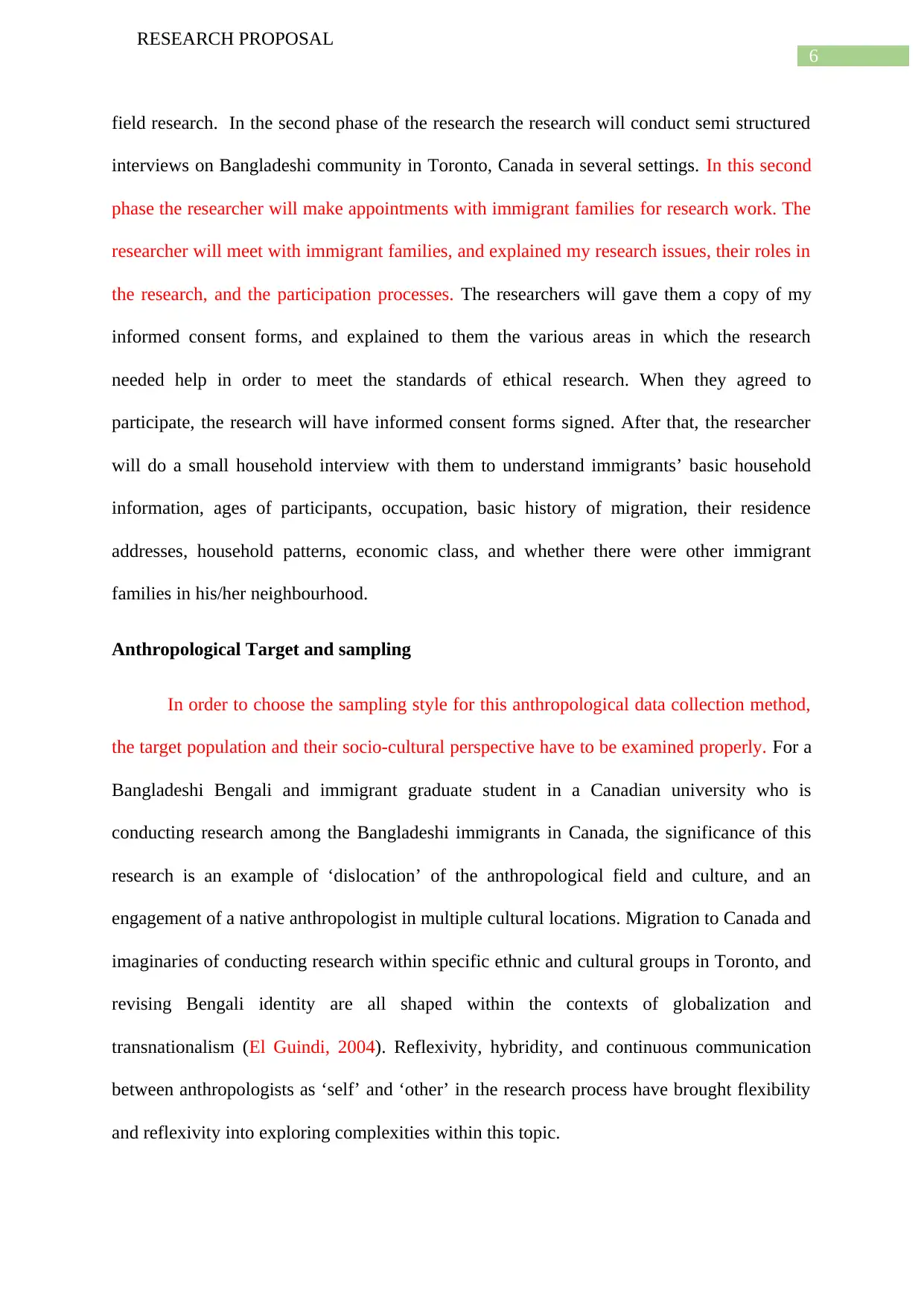
6
RESEARCH PROPOSAL
field research. In the second phase of the research the research will conduct semi structured
interviews on Bangladeshi community in Toronto, Canada in several settings. In this second
phase the researcher will make appointments with immigrant families for research work. The
researcher will meet with immigrant families, and explained my research issues, their roles in
the research, and the participation processes. The researchers will gave them a copy of my
informed consent forms, and explained to them the various areas in which the research
needed help in order to meet the standards of ethical research. When they agreed to
participate, the research will have informed consent forms signed. After that, the researcher
will do a small household interview with them to understand immigrants’ basic household
information, ages of participants, occupation, basic history of migration, their residence
addresses, household patterns, economic class, and whether there were other immigrant
families in his/her neighbourhood.
Anthropological Target and sampling
In order to choose the sampling style for this anthropological data collection method,
the target population and their socio-cultural perspective have to be examined properly. For a
Bangladeshi Bengali and immigrant graduate student in a Canadian university who is
conducting research among the Bangladeshi immigrants in Canada, the significance of this
research is an example of ‘dislocation’ of the anthropological field and culture, and an
engagement of a native anthropologist in multiple cultural locations. Migration to Canada and
imaginaries of conducting research within specific ethnic and cultural groups in Toronto, and
revising Bengali identity are all shaped within the contexts of globalization and
transnationalism (El Guindi, 2004). Reflexivity, hybridity, and continuous communication
between anthropologists as ‘self’ and ‘other’ in the research process have brought flexibility
and reflexivity into exploring complexities within this topic.
RESEARCH PROPOSAL
field research. In the second phase of the research the research will conduct semi structured
interviews on Bangladeshi community in Toronto, Canada in several settings. In this second
phase the researcher will make appointments with immigrant families for research work. The
researcher will meet with immigrant families, and explained my research issues, their roles in
the research, and the participation processes. The researchers will gave them a copy of my
informed consent forms, and explained to them the various areas in which the research
needed help in order to meet the standards of ethical research. When they agreed to
participate, the research will have informed consent forms signed. After that, the researcher
will do a small household interview with them to understand immigrants’ basic household
information, ages of participants, occupation, basic history of migration, their residence
addresses, household patterns, economic class, and whether there were other immigrant
families in his/her neighbourhood.
Anthropological Target and sampling
In order to choose the sampling style for this anthropological data collection method,
the target population and their socio-cultural perspective have to be examined properly. For a
Bangladeshi Bengali and immigrant graduate student in a Canadian university who is
conducting research among the Bangladeshi immigrants in Canada, the significance of this
research is an example of ‘dislocation’ of the anthropological field and culture, and an
engagement of a native anthropologist in multiple cultural locations. Migration to Canada and
imaginaries of conducting research within specific ethnic and cultural groups in Toronto, and
revising Bengali identity are all shaped within the contexts of globalization and
transnationalism (El Guindi, 2004). Reflexivity, hybridity, and continuous communication
between anthropologists as ‘self’ and ‘other’ in the research process have brought flexibility
and reflexivity into exploring complexities within this topic.
Paraphrase This Document
Need a fresh take? Get an instant paraphrase of this document with our AI Paraphraser
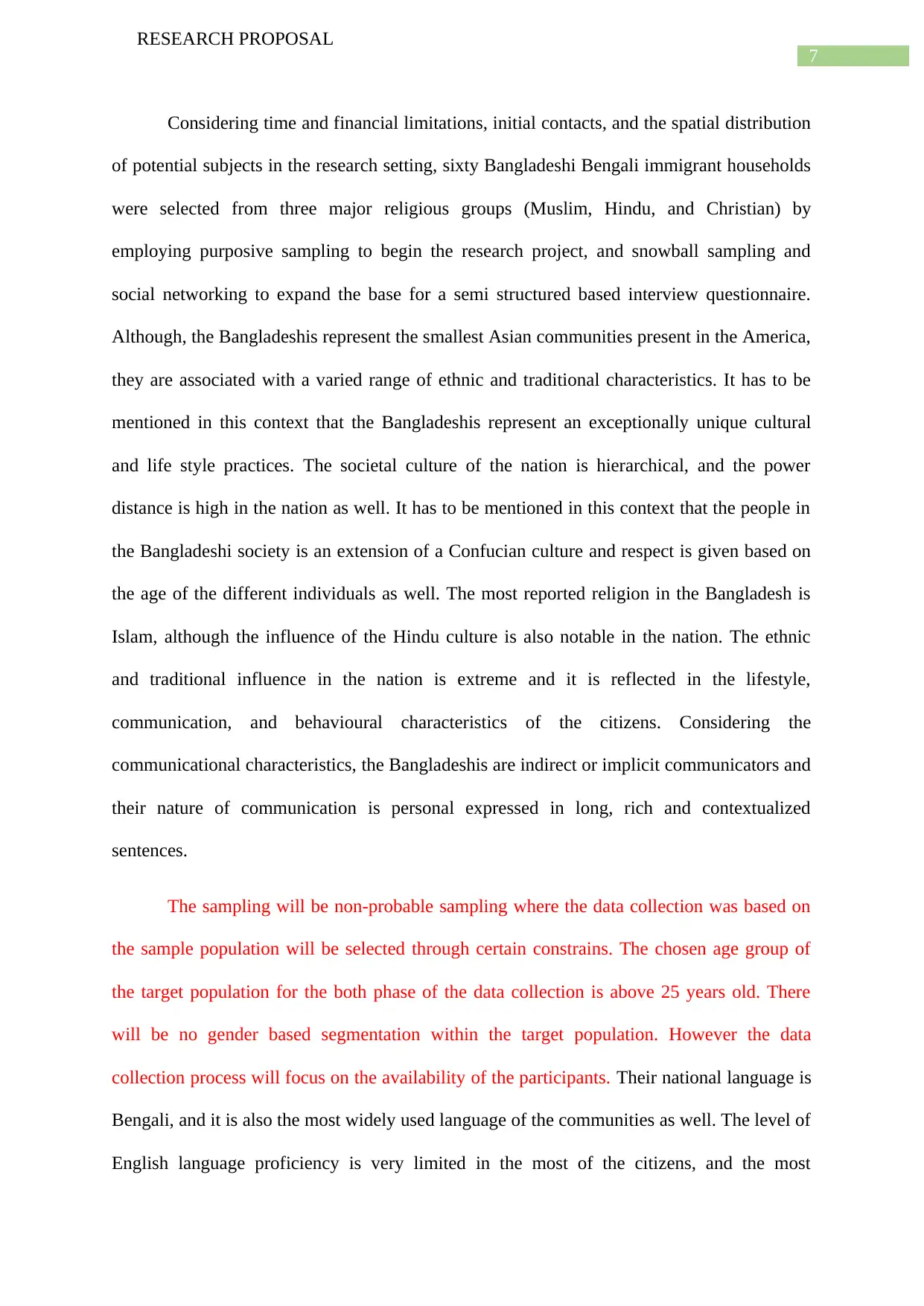
7
RESEARCH PROPOSAL
Considering time and financial limitations, initial contacts, and the spatial distribution
of potential subjects in the research setting, sixty Bangladeshi Bengali immigrant households
were selected from three major religious groups (Muslim, Hindu, and Christian) by
employing purposive sampling to begin the research project, and snowball sampling and
social networking to expand the base for a semi structured based interview questionnaire.
Although, the Bangladeshis represent the smallest Asian communities present in the America,
they are associated with a varied range of ethnic and traditional characteristics. It has to be
mentioned in this context that the Bangladeshis represent an exceptionally unique cultural
and life style practices. The societal culture of the nation is hierarchical, and the power
distance is high in the nation as well. It has to be mentioned in this context that the people in
the Bangladeshi society is an extension of a Confucian culture and respect is given based on
the age of the different individuals as well. The most reported religion in the Bangladesh is
Islam, although the influence of the Hindu culture is also notable in the nation. The ethnic
and traditional influence in the nation is extreme and it is reflected in the lifestyle,
communication, and behavioural characteristics of the citizens. Considering the
communicational characteristics, the Bangladeshis are indirect or implicit communicators and
their nature of communication is personal expressed in long, rich and contextualized
sentences.
The sampling will be non-probable sampling where the data collection was based on
the sample population will be selected through certain constrains. The chosen age group of
the target population for the both phase of the data collection is above 25 years old. There
will be no gender based segmentation within the target population. However the data
collection process will focus on the availability of the participants. Their national language is
Bengali, and it is also the most widely used language of the communities as well. The level of
English language proficiency is very limited in the most of the citizens, and the most
RESEARCH PROPOSAL
Considering time and financial limitations, initial contacts, and the spatial distribution
of potential subjects in the research setting, sixty Bangladeshi Bengali immigrant households
were selected from three major religious groups (Muslim, Hindu, and Christian) by
employing purposive sampling to begin the research project, and snowball sampling and
social networking to expand the base for a semi structured based interview questionnaire.
Although, the Bangladeshis represent the smallest Asian communities present in the America,
they are associated with a varied range of ethnic and traditional characteristics. It has to be
mentioned in this context that the Bangladeshis represent an exceptionally unique cultural
and life style practices. The societal culture of the nation is hierarchical, and the power
distance is high in the nation as well. It has to be mentioned in this context that the people in
the Bangladeshi society is an extension of a Confucian culture and respect is given based on
the age of the different individuals as well. The most reported religion in the Bangladesh is
Islam, although the influence of the Hindu culture is also notable in the nation. The ethnic
and traditional influence in the nation is extreme and it is reflected in the lifestyle,
communication, and behavioural characteristics of the citizens. Considering the
communicational characteristics, the Bangladeshis are indirect or implicit communicators and
their nature of communication is personal expressed in long, rich and contextualized
sentences.
The sampling will be non-probable sampling where the data collection was based on
the sample population will be selected through certain constrains. The chosen age group of
the target population for the both phase of the data collection is above 25 years old. There
will be no gender based segmentation within the target population. However the data
collection process will focus on the availability of the participants. Their national language is
Bengali, and it is also the most widely used language of the communities as well. The level of
English language proficiency is very limited in the most of the citizens, and the most
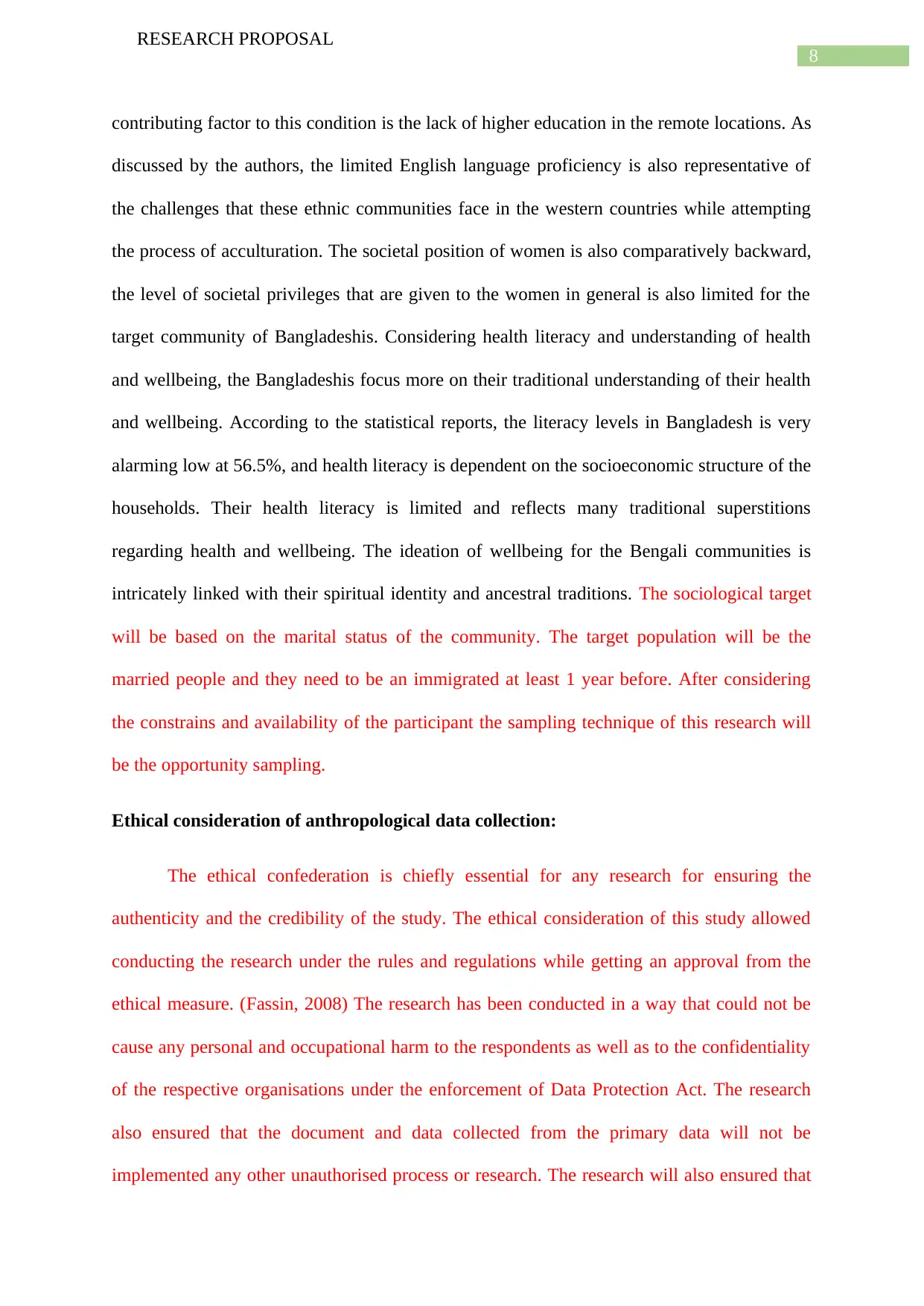
8
RESEARCH PROPOSAL
contributing factor to this condition is the lack of higher education in the remote locations. As
discussed by the authors, the limited English language proficiency is also representative of
the challenges that these ethnic communities face in the western countries while attempting
the process of acculturation. The societal position of women is also comparatively backward,
the level of societal privileges that are given to the women in general is also limited for the
target community of Bangladeshis. Considering health literacy and understanding of health
and wellbeing, the Bangladeshis focus more on their traditional understanding of their health
and wellbeing. According to the statistical reports, the literacy levels in Bangladesh is very
alarming low at 56.5%, and health literacy is dependent on the socioeconomic structure of the
households. Their health literacy is limited and reflects many traditional superstitions
regarding health and wellbeing. The ideation of wellbeing for the Bengali communities is
intricately linked with their spiritual identity and ancestral traditions. The sociological target
will be based on the marital status of the community. The target population will be the
married people and they need to be an immigrated at least 1 year before. After considering
the constrains and availability of the participant the sampling technique of this research will
be the opportunity sampling.
Ethical consideration of anthropological data collection:
The ethical confederation is chiefly essential for any research for ensuring the
authenticity and the credibility of the study. The ethical consideration of this study allowed
conducting the research under the rules and regulations while getting an approval from the
ethical measure. (Fassin, 2008) The research has been conducted in a way that could not be
cause any personal and occupational harm to the respondents as well as to the confidentiality
of the respective organisations under the enforcement of Data Protection Act. The research
also ensured that the document and data collected from the primary data will not be
implemented any other unauthorised process or research. The research will also ensured that
RESEARCH PROPOSAL
contributing factor to this condition is the lack of higher education in the remote locations. As
discussed by the authors, the limited English language proficiency is also representative of
the challenges that these ethnic communities face in the western countries while attempting
the process of acculturation. The societal position of women is also comparatively backward,
the level of societal privileges that are given to the women in general is also limited for the
target community of Bangladeshis. Considering health literacy and understanding of health
and wellbeing, the Bangladeshis focus more on their traditional understanding of their health
and wellbeing. According to the statistical reports, the literacy levels in Bangladesh is very
alarming low at 56.5%, and health literacy is dependent on the socioeconomic structure of the
households. Their health literacy is limited and reflects many traditional superstitions
regarding health and wellbeing. The ideation of wellbeing for the Bengali communities is
intricately linked with their spiritual identity and ancestral traditions. The sociological target
will be based on the marital status of the community. The target population will be the
married people and they need to be an immigrated at least 1 year before. After considering
the constrains and availability of the participant the sampling technique of this research will
be the opportunity sampling.
Ethical consideration of anthropological data collection:
The ethical confederation is chiefly essential for any research for ensuring the
authenticity and the credibility of the study. The ethical consideration of this study allowed
conducting the research under the rules and regulations while getting an approval from the
ethical measure. (Fassin, 2008) The research has been conducted in a way that could not be
cause any personal and occupational harm to the respondents as well as to the confidentiality
of the respective organisations under the enforcement of Data Protection Act. The research
also ensured that the document and data collected from the primary data will not be
implemented any other unauthorised process or research. The research will also ensured that
⊘ This is a preview!⊘
Do you want full access?
Subscribe today to unlock all pages.

Trusted by 1+ million students worldwide
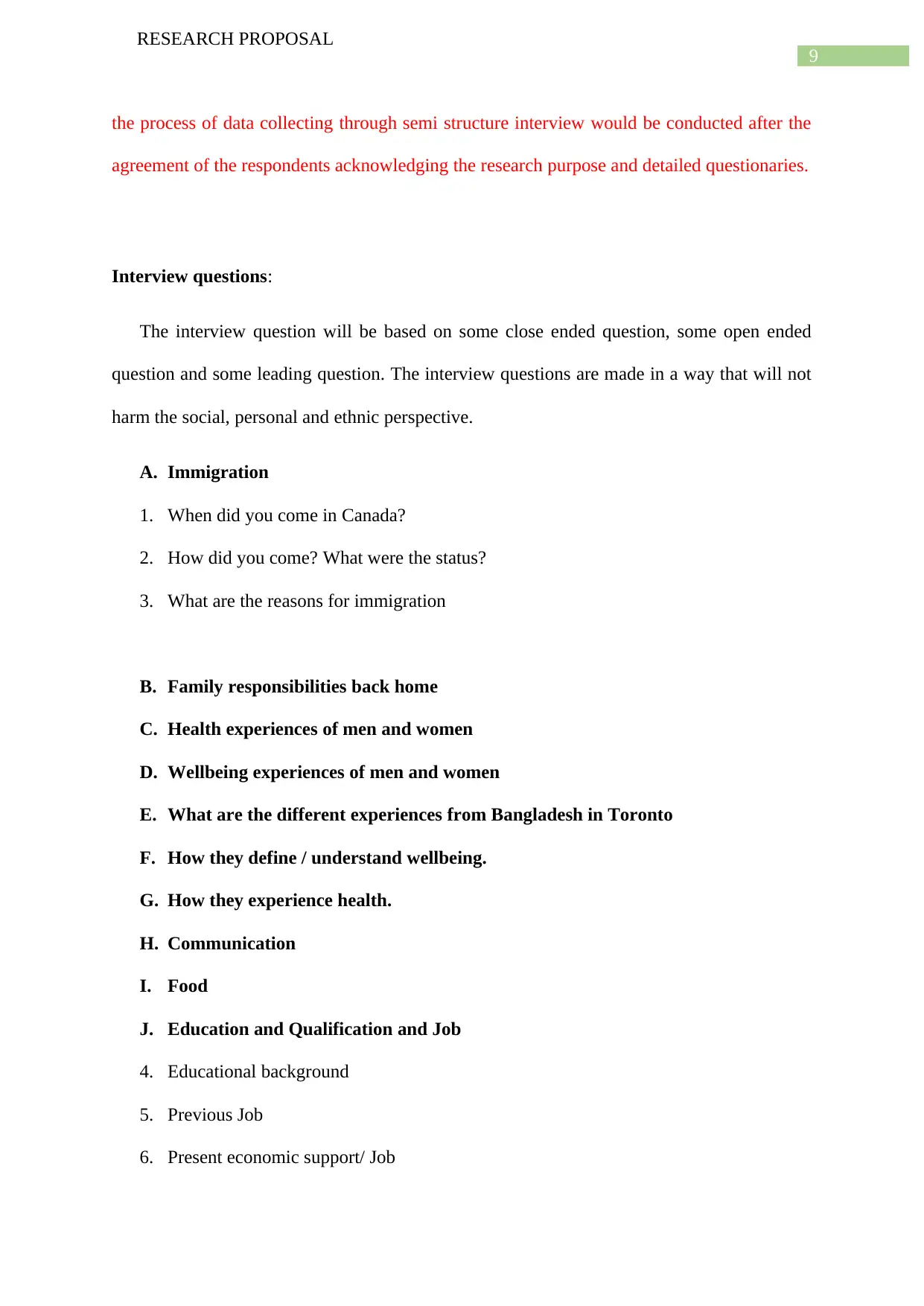
9
RESEARCH PROPOSAL
the process of data collecting through semi structure interview would be conducted after the
agreement of the respondents acknowledging the research purpose and detailed questionaries.
Interview questions:
The interview question will be based on some close ended question, some open ended
question and some leading question. The interview questions are made in a way that will not
harm the social, personal and ethnic perspective.
A. Immigration
1. When did you come in Canada?
2. How did you come? What were the status?
3. What are the reasons for immigration
B. Family responsibilities back home
C. Health experiences of men and women
D. Wellbeing experiences of men and women
E. What are the different experiences from Bangladesh in Toronto
F. How they define / understand wellbeing.
G. How they experience health.
H. Communication
I. Food
J. Education and Qualification and Job
4. Educational background
5. Previous Job
6. Present economic support/ Job
RESEARCH PROPOSAL
the process of data collecting through semi structure interview would be conducted after the
agreement of the respondents acknowledging the research purpose and detailed questionaries.
Interview questions:
The interview question will be based on some close ended question, some open ended
question and some leading question. The interview questions are made in a way that will not
harm the social, personal and ethnic perspective.
A. Immigration
1. When did you come in Canada?
2. How did you come? What were the status?
3. What are the reasons for immigration
B. Family responsibilities back home
C. Health experiences of men and women
D. Wellbeing experiences of men and women
E. What are the different experiences from Bangladesh in Toronto
F. How they define / understand wellbeing.
G. How they experience health.
H. Communication
I. Food
J. Education and Qualification and Job
4. Educational background
5. Previous Job
6. Present economic support/ Job
Paraphrase This Document
Need a fresh take? Get an instant paraphrase of this document with our AI Paraphraser
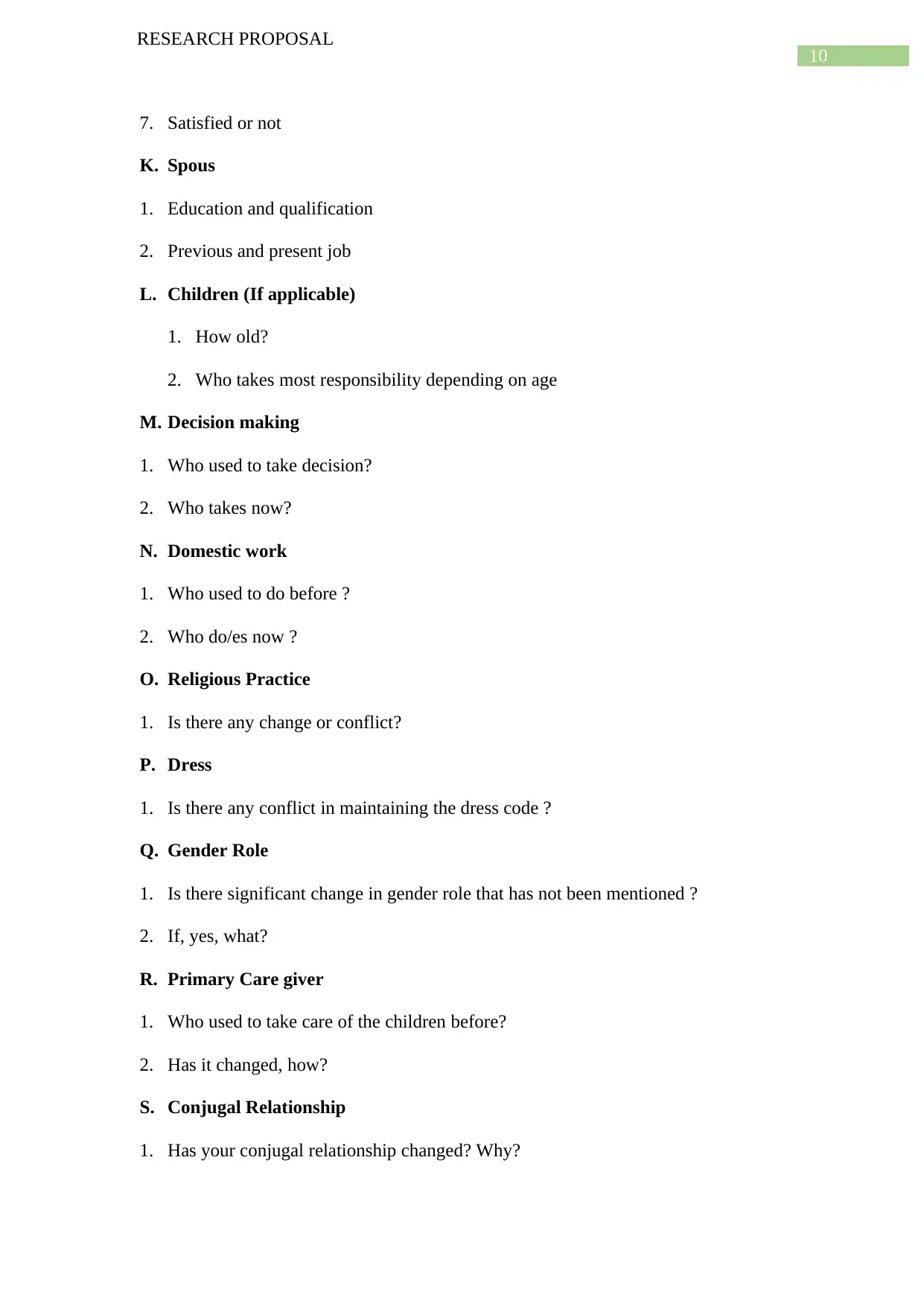
10
RESEARCH PROPOSAL
7. Satisfied or not
K. Spous
1. Education and qualification
2. Previous and present job
L. Children (If applicable)
1. How old?
2. Who takes most responsibility depending on age
M. Decision making
1. Who used to take decision?
2. Who takes now?
N. Domestic work
1. Who used to do before ?
2. Who do/es now ?
O. Religious Practice
1. Is there any change or conflict?
P. Dress
1. Is there any conflict in maintaining the dress code ?
Q. Gender Role
1. Is there significant change in gender role that has not been mentioned ?
2. If, yes, what?
R. Primary Care giver
1. Who used to take care of the children before?
2. Has it changed, how?
S. Conjugal Relationship
1. Has your conjugal relationship changed? Why?
RESEARCH PROPOSAL
7. Satisfied or not
K. Spous
1. Education and qualification
2. Previous and present job
L. Children (If applicable)
1. How old?
2. Who takes most responsibility depending on age
M. Decision making
1. Who used to take decision?
2. Who takes now?
N. Domestic work
1. Who used to do before ?
2. Who do/es now ?
O. Religious Practice
1. Is there any change or conflict?
P. Dress
1. Is there any conflict in maintaining the dress code ?
Q. Gender Role
1. Is there significant change in gender role that has not been mentioned ?
2. If, yes, what?
R. Primary Care giver
1. Who used to take care of the children before?
2. Has it changed, how?
S. Conjugal Relationship
1. Has your conjugal relationship changed? Why?
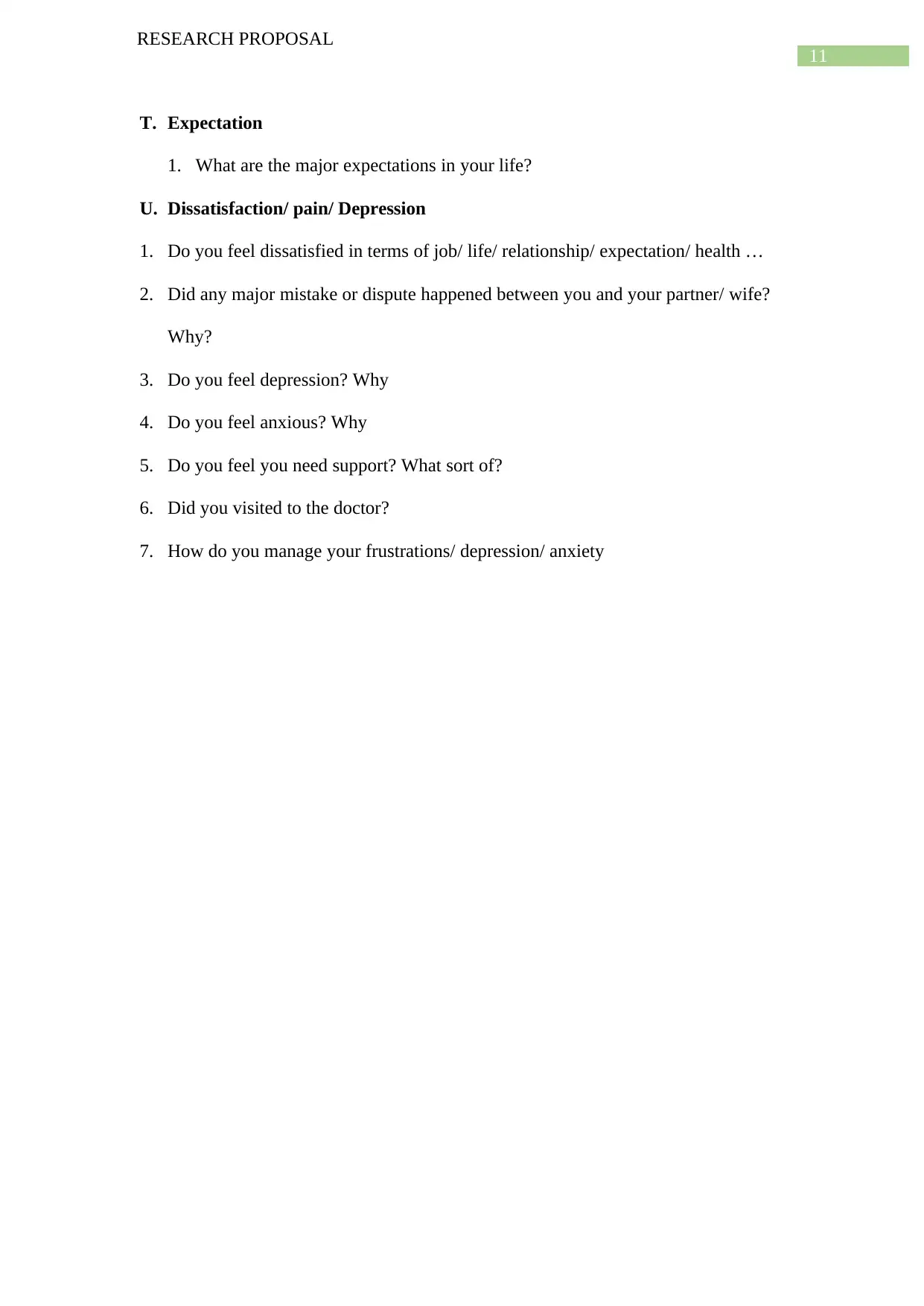
11
RESEARCH PROPOSAL
T. Expectation
1. What are the major expectations in your life?
U. Dissatisfaction/ pain/ Depression
1. Do you feel dissatisfied in terms of job/ life/ relationship/ expectation/ health …
2. Did any major mistake or dispute happened between you and your partner/ wife?
Why?
3. Do you feel depression? Why
4. Do you feel anxious? Why
5. Do you feel you need support? What sort of?
6. Did you visited to the doctor?
7. How do you manage your frustrations/ depression/ anxiety
RESEARCH PROPOSAL
T. Expectation
1. What are the major expectations in your life?
U. Dissatisfaction/ pain/ Depression
1. Do you feel dissatisfied in terms of job/ life/ relationship/ expectation/ health …
2. Did any major mistake or dispute happened between you and your partner/ wife?
Why?
3. Do you feel depression? Why
4. Do you feel anxious? Why
5. Do you feel you need support? What sort of?
6. Did you visited to the doctor?
7. How do you manage your frustrations/ depression/ anxiety
⊘ This is a preview!⊘
Do you want full access?
Subscribe today to unlock all pages.

Trusted by 1+ million students worldwide
1 out of 14
Related Documents
Your All-in-One AI-Powered Toolkit for Academic Success.
+13062052269
info@desklib.com
Available 24*7 on WhatsApp / Email
![[object Object]](/_next/static/media/star-bottom.7253800d.svg)
Unlock your academic potential
Copyright © 2020–2025 A2Z Services. All Rights Reserved. Developed and managed by ZUCOL.





